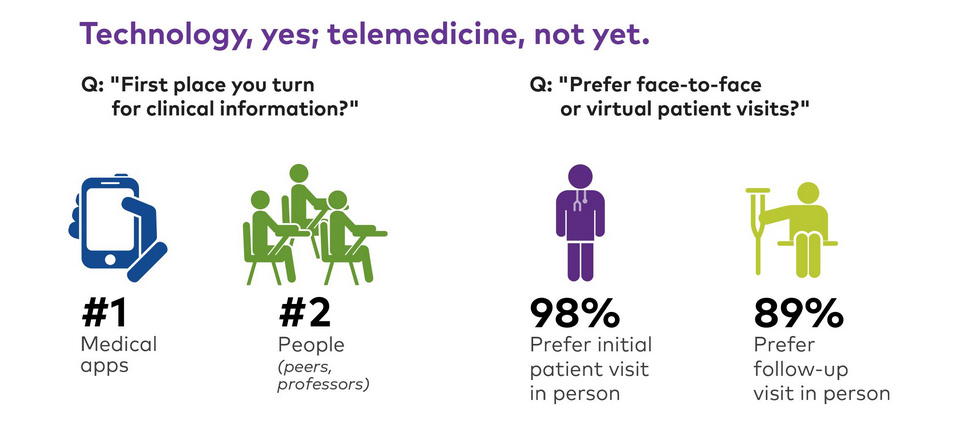
98 percent of medical students would prefer to see their future patients face-to-face for the initial visit as opposed to telehealth visits, according to results from the 10th annual Epocrates Future Physicians of America survey. Even for follow-ups, 89 percent of students favor the traditional face-to-face exam over virtual visits. The survey of more than 1,000 medical students who use Epocrates, finds 41 percent of students turn to a medical app first for clinical answers while only 29 percent would seek advice from a peer first.
Improved Interoperability is imperative
The survey finds 97% of students believe interoperability is critical to better care. According to medical students, fragmented care is the #1 safety risk for today’s patients, underscoring the need for improved and meaningful patient data sharing.
Almost all students believe that easily sharing patient records among care teams is critical to improving patient care, yet 44 percent are concerned about the ability to do so within a hospital or practice and 73 percent worry about the ability to share patient information across unaffiliated practices.
Other key interoperability findings include:
– Topping ‘to-do’ list: 96 percent believe that improving the ability of EHR systems to access patient data from other systems is important to providing better patient care, while the improvement of collaboration with extended care teams follows a close second.
– This mirrors results from an athenahealth survey of practicing physicians earlier this year, which found 96 percent of physicians believe in the importance of accessing relevant patient data from other EHR systems. 95 percent of physicians experienced a delay or difficulty delivering medical care because patients’ health records were not accessible/shared.
– 87 percent of students support creating a universal patient record.
Burdensome documentation is overwhelming
71 percent of third and fourth-year students report they spend more time documenting encounters than seeing the patients themselves. What’s more, 80 percent expect they will continue to document more than interact with patients when they become physicians.
Dissatisfaction with practice management training continues
For the fifth year in a row, medical students said they have been inadequately prepared to run a successful health care practice: only 8 percent feel equipped to manage a practice and only 4 percent to bill and code. Perhaps as a result, only 12 percent of students plan to work in a solo or partnership practice, continuing the trend toward employment by hospitals and large group practices.
The infographic shown below illustrates results of this year’s Future Physicians of America survey:

